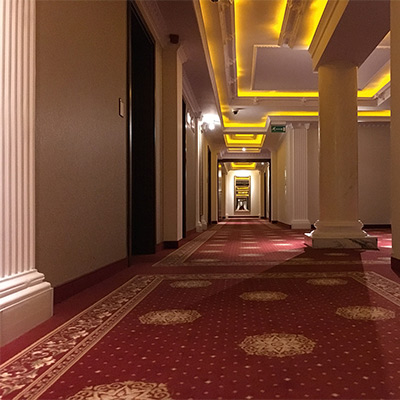Protecting Guests and Staff from Fire Hazards
Fire safety plays a key role in hotel facilities, where fire hazards can lead to tragic consequences for both guests and staff. Properly designed and maintained sprinkler systems are extremely important in protecting human life and property in such facilities. In this article, we will present why sprinkler systems are essential in hotels, discuss important design aspects and regulations regarding sprinkler systems in hotel facilities.
Why Sprinkler Systems Are Essential in Hotels
Hotel facilities, due to the large number of people staying there every day, increased risk of fire caused by electrical equipment, kitchens or heating installations, must be properly protected against fire. Sprinkler systems are one of the most effective and commonly used solutions in fire protection in hotels. They operate automatically, which allows for quick detection and extinguishing of fire before it spreads to other parts of the building.

Key Aspects of Sprinkler System Design in Hotel Facilities
- Code Compliance: The design of sprinkler systems in hospitality facilities must comply with applicable standards and regulations, such as NFPA 13, EN 12845 or local national codes.
- Fire hazard analysis: Fire hazards in the hotel should be carefully analyzed, taking into account primarily the type of building, the functions of individual rooms and the characteristics of the materials used in the construction.
- Selection of appropriate sprinklers: Depending on the fire hazard analysis, the appropriate type of fire sprinkler should be selected, such as rapid-acting or standard-acting sprinklers, foam sprinklers or closed-body sprinklers.
- Sprinkler placement: It is also important to properly arrange fire sprinklers in the hotel, taking into account primarily their arrangement in relation to sources of potential fire hazard, such as kitchens, technical rooms or the lobby. It is also necessary to provide an adequate number of sprinklers in a given area and adapt their arrangement to the structure of the building.
- Integration with other fire protection systems: Sprinkler systems should be integrated with other fire protection systems in the hotel, such as smoke detection systems, alarm systems or evacuation systems, which will allow for even more effective fire protection.
- Maintenance and inspections: Regular inspection and maintenance of sprinkler systems are essential to ensure their reliability and effective operation in the event of a fire. Routine inspections and servicing should be carried out in accordance with applicable regulations.
Hotel facilities, due to the large number of people staying there every day, increased risk of fire caused by electrical equipment, kitchens or heating installations, must be properly protected against fire. Sprinkler systems are one of the most effective and commonly used solutions in fire protection in hotels. They operate automatically, which allows for quick detection and extinguishing of fire before it spreads to other parts of the building.
Regulations for sprinkler systems in hotel facilities
Sprinkler systems in hotels must comply with applicable regulations and standards. Many countries use standards such as NFPA 13 (National Fire Protection Association) or EN 12845 (European standard). These values are intended to ensure a high level of fire safety in hotels, thanks to the use of proven technical solutions and control procedures.
Summary
Sprinkler systems are extremely important in fire protection of hotel facilities. Properly designed, installed and maintained sprinkler systems are crucial to ensure the safety of both guests and hotel staff. Therefore, both in the case of designing new facilities and modernizing existing ones, emphasis should be placed on providing appropriate fire protection systems, including sprinkler systems. Compliance with applicable regulations, standards and principles of sprinkler system design will contribute to ensuring a high level of fire safety in hotel facilities.
